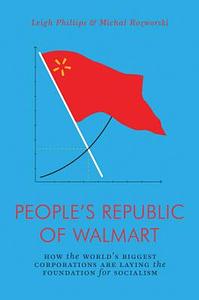Take a photo of a barcode or cover
informative
slow-paced
Neat book promoting the premise of how socialist-style planning is not only possible, but used quite a bit within the boundaries of increasingly-large and complex firms. The kind of book that hops between a bunch of different topics and aspects, and I’m not sure it’s served well by the particular order they chose. I might have instead re-arranged it as a history of planning, at the risk of putting some of the more remote Russian Revolution stuff at the beginning instead of front-loading it with Walmart/Amazon as they do here.
Still, plenty of valuable material here and it’s pretty accessible to audiences. Spent the entire book wondering why they weren’t mentioning Cybersyn, and then was pleased when it made up a chapter towards the end. No index or footnotes or bibliography makes it tough to follow up on interesting topics, though!
Still, plenty of valuable material here and it’s pretty accessible to audiences. Spent the entire book wondering why they weren’t mentioning Cybersyn, and then was pleased when it made up a chapter towards the end. No index or footnotes or bibliography makes it tough to follow up on interesting topics, though!
The book is written in an engaging and entertaining manner and is easy to read.
However, I expected it to be more about specifically how Walmart etc. do planning and how this might be co-opted in socialism.
The latter is discussed quite a bit, but the former barely at all beyond the most basic details.
There is also a lot of time spent discussing the failure of central planning in the USSR, I found this interesting and the discussion was good but it seemed a bit of a tangent to the main topic of the book and I would have preferred the space to have been used to discuss modern planning techniques and proposals.
It's a good book though - I would recommend it to others.
However, I expected it to be more about specifically how Walmart etc. do planning and how this might be co-opted in socialism.
The latter is discussed quite a bit, but the former barely at all beyond the most basic details.
There is also a lot of time spent discussing the failure of central planning in the USSR, I found this interesting and the discussion was good but it seemed a bit of a tangent to the main topic of the book and I would have preferred the space to have been used to discuss modern planning techniques and proposals.
It's a good book though - I would recommend it to others.
informative
reflective
slow-paced
challenging
dark
informative
medium-paced
A map to the future which might not be complete ruin? easy enough to understand and gives me some hope.
informative
medium-paced
Can technology save us? This book seems to answer both yes and no. Yes technology can allow central planning to create a socialist society where the analogue USSR failed. Technology can also be used to dominate us as seen with how Walmart and Amazon use it. I definitely came out with more hope for the future after finishing this book, which is rare for the books is usually read. Is Walmart just some legal tweaks away from being the basis of a future socialist society?
I appreciated the simplistic writing of the book as someone with no knowledge of hard economics or computer science. I would have liked some parts to be more academic, since sometimes it made claims that seemed interesting but had zero citations for me to follow up on.
I appreciated the simplistic writing of the book as someone with no knowledge of hard economics or computer science. I would have liked some parts to be more academic, since sometimes it made claims that seemed interesting but had zero citations for me to follow up on.
challenging
funny
informative
slow-paced
Not really about Walmart. Half of the book is about the Soviet Union. Really more like a layman's summary of the last hundred years of the socialist calculation debate. At that goal, it does an OK job.



